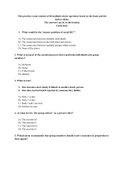Prüfung
Group Dynamics - Practice Exam
- Kurs
- Hochschule
This is a practice exam I made myself based on all the literature, lecture slides, and homework assignments. It includes a total of 60 realistic multiple-choice questions; a good way to test your knowledge and preparation! The answers are completely at the bottom. Good luck!
[ Mehr anzeigen ]



